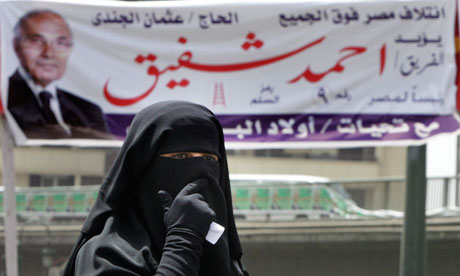And the Islamists have made it worse. A Coptic Christian woman said to me "we and our Muslim friends who do not cover our hair get yelled at by men passing by telling us 'just you wait, those who will cover you up and make you stay at home are coming, and then there will no more of this lewdness'". It was, she said, as if they were gloating over the fact that we were being pushed off the streets. Another woman told me that girls and women wearing mid-sleeved clothing had been slapped on their bare arms by men on bicycles shouting slurs. Another told me she had been spat on by men telling her to cover up. Another told me that she had her hair up in a pony tail and a young man pulled it so hard that she thought her head was going to fall off. Another recounts how she was pushed and elbowed by a passerby telling her to cover her nakedness (she was wearing a mid-sleeved blouse and trousers).
The political battles over who reigns over Egypt are not only being fought over presidential and parliamentarian seats, but also over who can claim more control over a woman's body. Take the example of Bishop Bishoy, one of the nominees for the papal seat of the Coptic Orthodox Church (Coptic Christians in Egypt account for roughly 12% of the population). In a recent religious event which was attended by the governor of Damietta, high-ranking officials and politicians, he said that Christian women should dress more modestly like their Muslim sisters and that they should follow their example. In view of the fact that the great majority of Muslim women are now veiled, this can only mean that he wishes Christian women to cover their hair too. In the streets of Egypt, many Coptic women have been told "Our Lady Mariam [referring to St Mary] used to wear a tarha [long scarf covering the hear], why can't you follow her example and cover up?".
Many Coptic women were infuriated. It is bad enough that thanks to the Islamists and a hostile government, they are now subjected to the most virulent of anti-Christian sentiment in their day-to-day life but to also get it from a high-ranking authority in the Coptic church is too much. They had no illusions why Bishoy made such a statement: he wants to win over the Islamists by showing he is willing to comply with their dress code for women.
To express their opposition to the political instrumentalisation of Coptic women by Bishoy for his own political ends, about 50 Coptic women and men staged a protest in the Coptic Patriarchate in Abbassiya on 18 May. This was the first time in the modern history of Egypt that Coptic Christian women had risen against a member of the clergy in protest. It is the first time they had collectively raised their voice to demand their rights as Coptic Christian women. The protests did not go well with all Christians: what's wrong with modesty many said, why attack the church now? Others said that while they completely sympathised with the cause of the protesters, this was not the time.
As one of the organisers of this protest, I tried to explain why we couldn't wait. I explained that if there is talk of women's modesty today, tomorrow there is more pressure on veiling, the day after it is going to be a socially imposed ban on trousers, after that a ban on women's freedom of mobility, until bit by bit, inch by inch we are driven back home.
We, as Coptic Egyptian women, will not allow ourselves to be used as pawns by any leader inside the church or out to achieve his own political ends.

